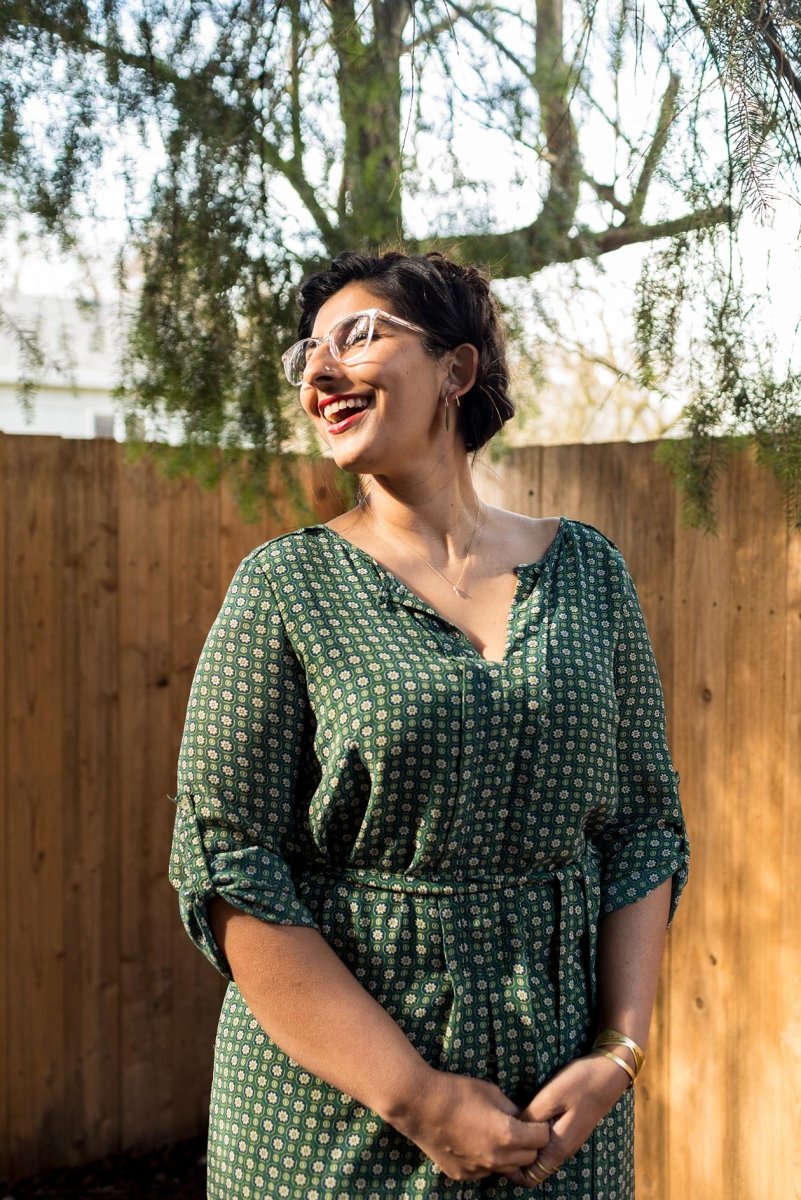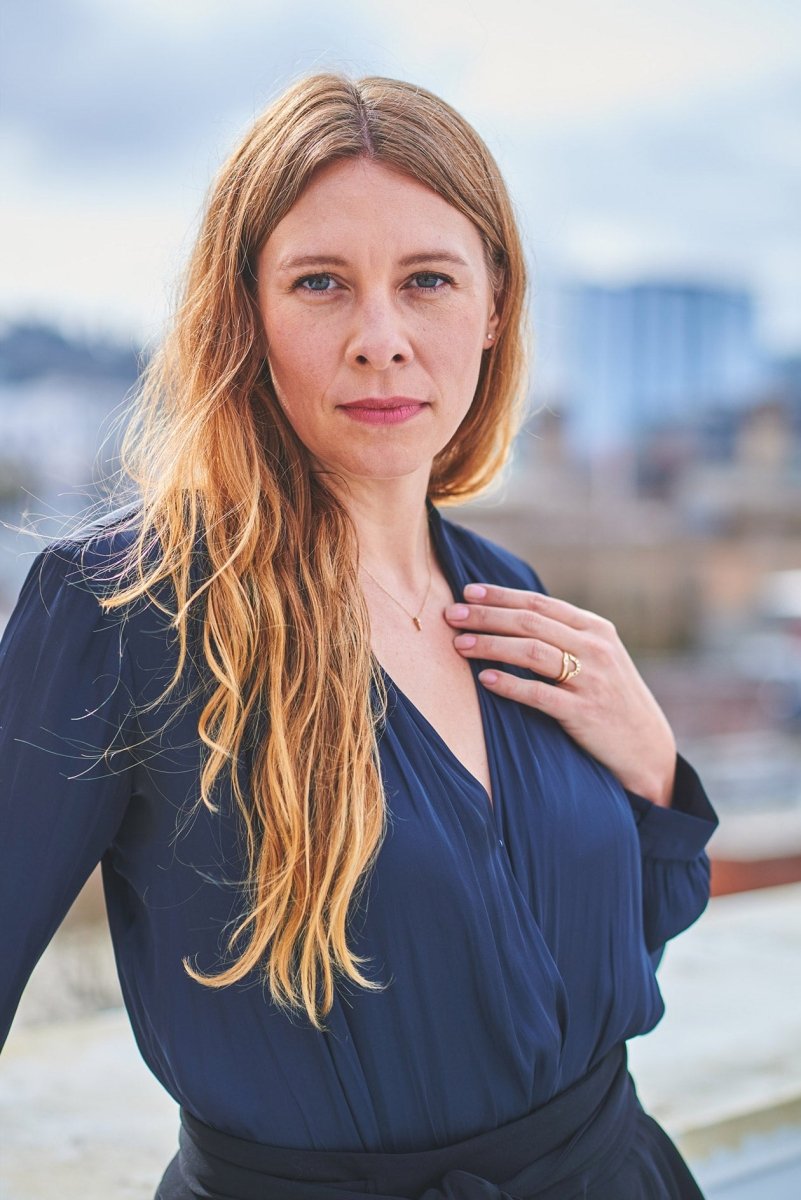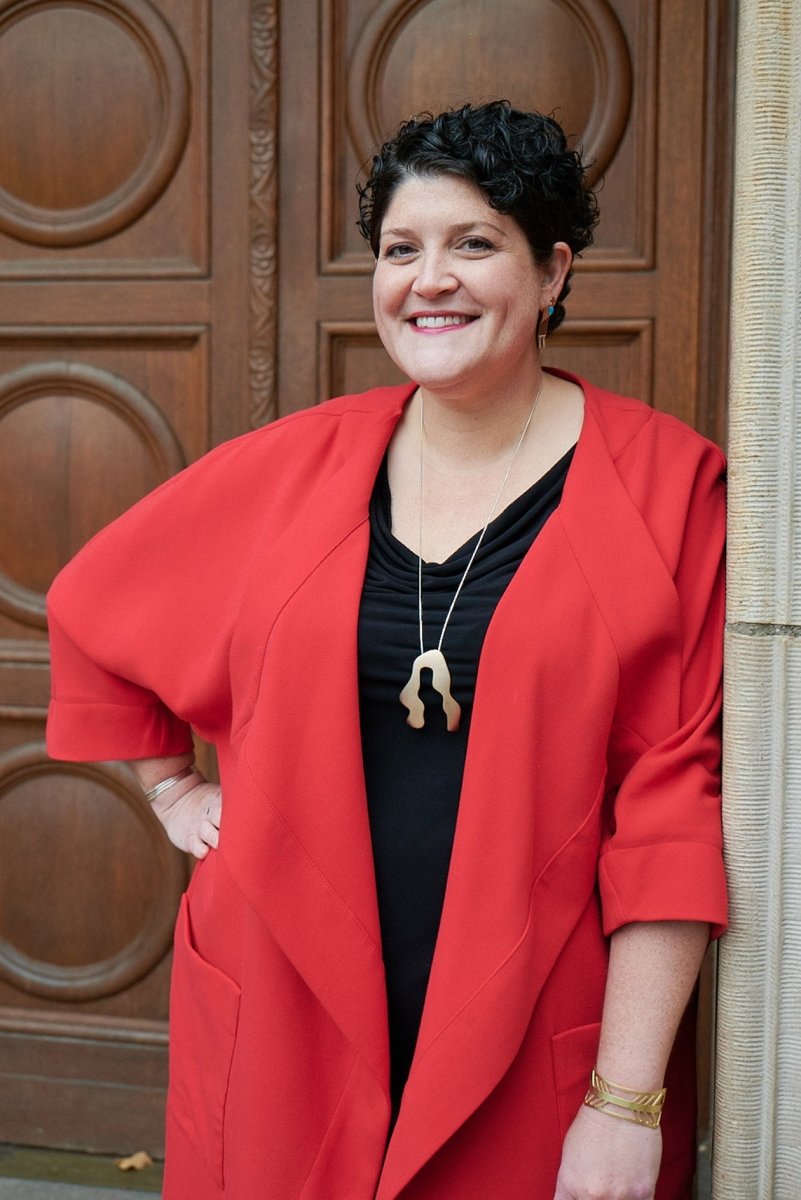By Frayn Masters | 4/2/2021
Darshanpreet Gill has “literally taught every grade level between kindergarten through 12th grade.” Like you, like me, like all of us, she spent some of the past year navigating the challenges of the pandemic, making the jolting environmental shift to an online classroom along with the strangely comforting sartorial shift to teacher-on-the-top/pajamas-on-the-bottom outfits. Were I to pick a team to survive a deserted island, without question I would inquire as to her availability. When a dramatic shift arises, Darshanpreet turns on a flashlight, steps inside to survey the damage, then draws a map to forge through the darkness.
Her teaching beliefs center around the juicy things that make us feel like worthy humans: to be seen, heard, understood — to feel connected. She is self-possessed with a huge side of humility, straightforward with a dry sense of humor, and it’s all wrapped up in an empathy blanket. The depth of her love for students radiated across all our conversations.
But she is also a teacher who got fired. Not the bad kind of fired, the good kind of fired. You know, the Erin Brockovich kind, for being a badass and speaking up.
Darshanpreet grew up in central California in Selma, a small farming town outside of Fresno. Her family was part of a large Punjabi community, where there were always big weddings and events. She spent a lot of time with her grandpa. They’d go on walks and he taught her to play the harmonium, a small organ-like instrument from India.
I ask her to describe childhood. “I was a full on loser,” she says with matter-of-factness and a grin. Houses were miles away from each other. It was hard to make friends her age, so she spent a lot of time in make-believe worlds. “I was super weird. One day we learned that trees were living things. After that I would read books to my favorite tree on the playground.”

“The Saturday after my first week of teaching I woke up and felt like I had just gotten a second lease on life. I had survived a near death experience. I felt oxygen coming into my lungs and said to myself, ‘life is different now.’”
Her not-the-same-age friend Anne, the school librarian, was out sick one week. Books were stacking up, but nobody knew how to shelve them. Except, one person did: 4th grader, Darshanpreet. “I knew how the little cart system worked and so I returned all the books to their places. It was one of the best days of my life. I loved it.”
When she speaks about her younger self, Darshanpreet wears her unshiney descriptors like badges of honor: they are her superpowers, the seeds of her character.
She finally found her group of co-nerds in high school, “I was one of the ‘smart kids.’ We were always ending up in the same classes... except for PE. We were teacher pleasers. Very compliant. A sexually and socially naive bunch. We didn't party.” She and I both laughed through a story about a time this bunch went to the mall and hid in a countrywares shop to spy on other kids from school and wonder if they had sex, and if so, did they use condoms? When she and her friends got home they were ecstatic that they had all stayed out so late. “We took a picture with the clock because it was almost 11pm,” she says. “It was the latest we'd ever stayed out and we wanted to commemorate it.”
Is it any wonder that the kid who read to trees, had the best day of her life shelving books, and who studiously observed the mating patterns of kids outside her uber studious friend group, chose to become a teacher?
The inaugural science teaching job for a somewhat sheltered Darshanpreet took place at the only high school in a small farming town close to where she grew up. Even though she’d gone to school for just this job, the reality of stepping into the classroom was a whole new ball of wax she had to shape into an education candle.

A glowing Darshanpreet in our Conata hoops and Suru studs. Shop her look.
To cope with feeling terrified on her first day, she donned “Dress Barn” armor. “I took a photo of myself in the mirror in my little teacher outfit,” she says. “It was black pants, a top with loud flowers, a funky blue necklace, and I wore a low side pony.”
She was 27, but she says, looked 18. “All the kids were close to 18—some were older because they were in the country without documentation for their actual birth dates. They would tell me, ‘well I'm actually 20.’” The only thing she had to rely on in those first teaching moments was her own experience as the very compliant student. She thought, “they are going to be so impressed with all of my colored markers and beautiful slides — they will just do their work and learn.” She says her initial perspective was very self-focused. “I went in with the idea that they’d be marveling at how good I was at lecturing” because her schooling didn’t prepare her to offer more. She felt she “had to plan every single moment for fear that I would lose control. It was not sustainable; it was insanity.”
But her perspective and teaching style began to shift: “The Saturday after my first week of teaching I woke up and felt like I had just gotten a second lease on life. I had survived a near death experience. I felt oxygen coming into my lungs and said to myself, ‘life is different now.’”

Darshanpreet in our Geometric Leaf Drop earrings and Navvitas studs. Shop Darshanpreet's look.
She dug into figuring out how to recognize and work with the kids as individuals with individual needs. When she was a student, she thought the kids who asked questions were troublemakers. They got kicked out of class a lot. Now she’s done a complete 180 on that stance: “If they ask a question, they are not coming for me or being disrespectful, they are just asking a question. On my best days, I can just hear it, answer it, and move on.” Questions are a window to a deeper connection. “I try and allow for people to just be themselves and manage themselves,” she says. Still, she has a special spot for the kids who are like she was. “I tell them to stay weird. It keeps you safe.”
As she dove further into that first year of teaching, she began to see how good she was at problem solving. “It's one of my favorite things to do.” She also wrangled her good sense of humor to help students listen and absorb information. This is not a ‘hey look at me I’m the funny teacher’ vibe, it’s a ‘hey, look at you learning over there without hardly knowing it’ vibe. During that first year, Darshanpreet would invent games that highlight lessons on the fly. Sometimes she’d break the kids into teams to compete in response to topical questions. “They’d love it so much,” she says. Her classroom would get rowdy and other teachers would complain. She could deal with those complaints because the students were “demonstrating their learning with enthusiasm.”
“High school is hard, but the kids are never the reason. The reason it's hard is because we are underfunded as an institution. We are disrespected in our professions. And it is an expectation that every day we be heroic.”

Her confidence went up 100%, because, she says, “I can get teenagers to listen to me. I have broken up fights just trying to get kids to learn science. I wasn’t like this before, but now I am very rarely intimidated by anybody inside or outside of the job. I still get scared, but I no longer let that stop me.”
Even with this new confidence, as she prepared for her second year of teaching, she was again denied a request for the supplies and textbooks her students needed to be successful.
“I was so angry,” she says, “I thought: these kids are so great and they deserve the proper tools.” She started tracking things. The administrators were all very chummy. They wore expensive watches and drove luxury cars. Darshanpreet noticed when they bought extravagant things more for photo ops than anything else – like a huge inflatable tunnel for football players to run through. Administrators flew to a prestigious conference meant for teachers and spent wildly on booze and nights out. Darshanpreet was not the only teacher noticing. “My rage was growing because I really loved these kids, but the money kept going to these dumb ass purchases.”
She suspected that it was hard for people to speak up because the school served a population of mostly migrant workers. “Ninety-nine percent of my kids spoke Spanish as their first language, and I know how scared some of those parents were – especially the ones that were undocumented. They were afraid of raising any sort of ruckus about anything. It's one of those situations where people are being 100% taken advantage of.” There was no outside force to put checks and balances in place.

Darshanpreet with a stack of Lita bangles, our Kacie ring and Nous ring. Shop her collection.
Darshanpreet seized on her moment. “It was near the end of my second year. I was teaching my third period class when I got called to the district office.” She was taken one block away, via a school campus golf cart, to the ridiculously high tech district offices (ummm… case in point?). They brought her in to talk about renewing her contract for the following year.
She had conditions before she would sign. “I wanted a guarantee that all my supplies would be ordered before the start of the school year. I wanted to know where the money was going, and I wanted [them] to own up to what [they] did with it… [They were] sort of neutral,” she says.
A few days later, she got called into the principal's office.
The principal suggested she resign before the district let her go, otherwise it would go on her record as a firing. “They are pissed,” he said. She was also asked to agree never to apply for a job in that district again or tell her beloved students she would not be coming back. “The district people feared that the students would organize around keeping me. They said they would charge me with ‘inciting a riot,’ if I told them I was going.”
Scared, Darshanpreet contacted the union and they got her a lawyer.

Left: Darshanpreet wears our Tilikum Crossing cuff bracelet and Kacie, Sisa and Nous rings. Right: She shines in our Conata hoops, Suru studs and Navvitas necklace. Shop Darshanpreet's look.
It comes as no surprise that Darshanpreet protested at the next school board meeting – and wrote a letter to editor of the Fresno Bee blowing the whistle. “It was so hard not to say anything to the kids,” she says, “but I stayed for my remaining two months. The district was relentlessly terrible to me.”
After she left, an investigation ensued. She was called in a few times to testify against two men she had been tracking. She says both of them eventually ended up being fired.
Despite all this mayhem, her passion for teaching remains for one simple reason: teaching is her joy and her calling. She sees so much hope for this generation. This is her eighth year as a teacher, sixth in Portland. She’s at McDaniel (formerly Madison) High School in SE Portland, where it’s not all shiny apples, of course. “High school is hard, but the kids are never the reason. The reason it's hard is because we are underfunded as an institution. We are disrespected in our professions. And it is an expectation that every day we be heroic.” I asked her what helps her feel most supported and she said, “just tell a teacher that they're doing a great job or that your kid really likes their class, you know, any little story like that — and fight for more funding.”

Questions are a window to a deeper connection. “I try and allow for people to just be themselves and manage themselves,” she says.
Darshanpreet keeps showing up for teaching tomorrow’s adults, returning back to the inside of her classroom pajama-bottom-free and with her webcam powered off. This has been a year, more than a year. And yet here we all are, alive, pivoting, failing, flailing, crying, and still searching for the good amidst all the pain.
Every new school year, Darshanpreet says to herself, ‘Oh my God, how did I get these kids? I really need to enjoy this year, I'm never going to get kids this fantastic again.’ Then the next year, she says to herself, “Oh my God, how did I get these fantastic kids? This is the best freakin’ job ever.”
Maybe that’s one of COVID’s best lesson plans: the good amidst all the pain isn’t hiding. It’s looking at us in the mirror; it’s teaching our kids; it’s standing up for what’s right. And it’s getting more courageous every day.
PRODUCED BY FRAYN MASTERS
PHOTOS BY CELESTE NOCHE



